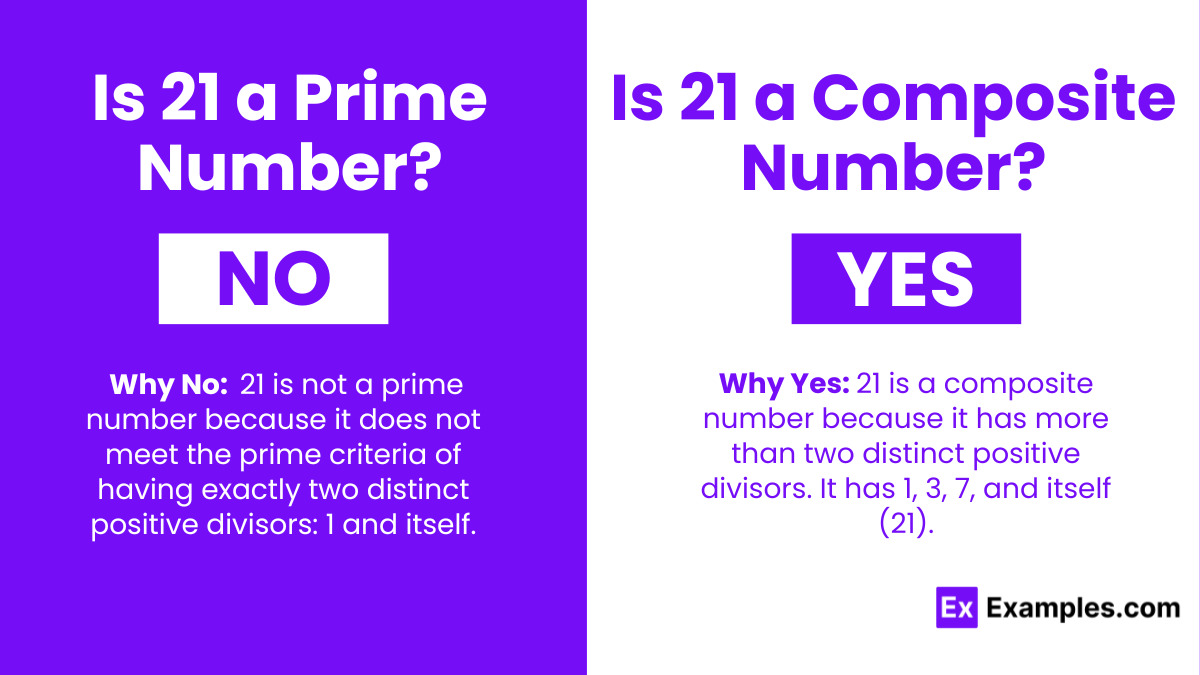Which of the following statements is true about the number 21?
It is a prime number.
It is a composite number.
It is neither prime nor composite.
It is both prime and composite.


No – 21 is not a Prime Number.
Why No: 21 is not a prime number because it does not meet the prime criteria of having exactly two distinct positive divisors: 1 and itself. See any number if it’s prime number or not.
Yes – 21 is a Composite Number.
Why Yes: 21 is a composite number because it has more than two distinct positive divisors. It has 1, 3, 7, and itself (21).
| Property | Answer |
|---|---|
| Is 21 a prime number? | No |
| Is 21 a composite number? | Yes |
| Is 21 a perfect square? | No |
| Factors of 21 | 1, 3, 7, 21 |
| Multiples of 21 | 21, 42, 63, 84, 105, 126, 147, 168, 189, 210 |
| Cube Root of 21 | 2.76 |
| Square of 21 | 441 |
| Square Root of 21 | 4.58 |
| Is 21 a Perfect Square? | No |
| Is 21 a Perfect Cube? | No |
| Is 21 an Irrational number | No |
| Is 21 a Rational number | Yes |
| Is 21 a Real number | Yes |
| Is 21 an Integer | Yes |
| Is 21 a Natural number | Yes |
| Is 21 a Whole number | Yes |
| Is 21 an Even or odd number | Yes (21 is an odd number) |
| Is 21 an Ordinal number | Yes |
| Is 21 a Complex number | Yes (as all real numbers are also complex numbers) |
The factors of 21 are 1, 3, 7, and 21. 21 is not a prime number because it is divisible by numbers other than 1 and itself, highlighting its composite nature. There are multiple factors of 21, making it clear that it is not a prime number.
21 is recognized as a composite number because it has more than two divisors: 1, 3, 7, and itself (21). This characteristic distinguishes it from prime numbers, which have exactly two divisors. The number 21, while it may not hold the same type of cultural or numerical significance as 20 in terms of counting systems, is primarily noted in mathematics for its composite status. Its properties as an odd, composite, and natural number make it a noteworthy figure in various mathematical and conceptual frameworks.
The 21st prime number is 73. Prime numbers are those that have only two distinct positive divisors: 1 and themselves, and 73 fits this definition.
The composite of 21 refers to its factors other than 1 and itself, which are 3 and 7. A composite number has more than two divisors.
Text prompt
Add Tone
10 Examples of Public speaking
20 Examples of Gas lighting
Which of the following statements is true about the number 21?
It is a prime number.
It is a composite number.
It is neither prime nor composite.
It is both prime and composite.
Which set of numbers correctly identifies the nature of 21?
1, 21
1, 3, 7, 21
1, 2, 21
1, 3, 21
What is the classification of the number 21 based on its divisors?
Prime
Neither
Composite
Undefined
Is the number 21 divisible by any numbers other than 1 and itself?
No, it is only divisible by 1 and itself.
Yes, it is divisible by 1, 2, and itself.
Yes, it is divisible by 1, 3, and 7.
Yes, it is divisible by 1 and 5.
Which description best fits the number 21?
A prime number with three divisors.
A composite number with four divisors.
A prime number with two divisors.
A composite number with only two divisors.
How can you tell that 21 is not a prime number?
It has exactly two divisors.
It is only divisible by 1.
It is only divisible by itself.
It can be divided by numbers other than 1 and itself.
What type of number is 21 in the context of number theory?
Prime
Irrational
Composite
Real
If you were to factorize 21, what would the factors be?
1, 21
1, 3, 21
2, 21
1, 3, 7
Which characteristic is true for all composite numbers, including 21?
They have exactly two distinct positive divisors.
They have more than two distinct positive divisors.
They are all divisible by 2.
They cannot be expressed as a product of prime numbers.
Which number is similar to 21 in terms of being a composite number?
17
19
22
23
Before you leave, take our quick quiz to enhance your learning!

